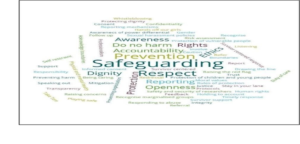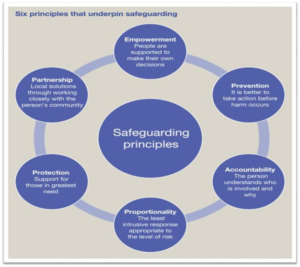CommonWealth College of Excellence (CCE)
Safeguarding Policy
Introduction – INTENT
It is important that you feel safe at Commonwealth College of Excellence, in your personal life and in the community. At CCE, we are committed to taking action to safeguard and promote the welfare of our students. It is our legal and moral duty as a college to safeguard and protect the welfare of all young people and vulnerable adults.
The purpose of this policy statement is:
- To protect Learners who receive the CCE’ services from harm.
- To provide staff as well as Learners and their families, with the overarching principles that guide our approach to safeguarding.
- This policy applies to anyone working on behalf of the CCE, including senior managers, paid staff, volunteers, sessional workers, agency staff and students.
- All staff are trained to provide help as soon as possible and will refer any safeguarding concerns to the college’s dedicated safeguarding team.

Promotion of Policy – IMPLEMENTATION
CCE will promote and ensure that all the stakeholders are engaged towards the Safeguarding Policy. All the staff will be trained to ensure that they are well versed with the policy and can implement it following the details and sequenced processes contained in the policy. Seminars relating to the policy will be held at regular intervals to update any changes. Students will be invited to participate and contribute their views.
Everyone at CCE has a responsibility to ensure proper implementation of the policy and to report any real or perceived deviation from our principles, operating guidelines, policy requirements and legal frameworks applicable to this area.
We will train and engage our staff and our students to abide by the rules and principles included in CCE policy of safeguarding. With a particular focus on the dangers of sexual violence and sexual harassment and PREVENT strategies. These act to prevent activities such as radicalisation of groups and individuals towards extremism both during the recruitment process or provision of learning and all services. This will take place in INDUCTION and on an ongoing basis through monthly review discussions and other learning events on the subject to regularly engage learners in the importance of supporting and creating a SAFEGUARDING CULTURE.
For this Policy and associated Code of Practice, the term “staff” will be used to describe those people employed on a contract of employment at the College, as well as those working on consultancy agreements, as contractors and on a voluntary or unpaid basis. The term “student” will be used to describe anyone registered with the College.
The college’s Safeguarding Policy encompasses students’ protection and provide preventative measures that keeps both learners and staff safe. This includes early intervention and reporting of abuses such as neglect, promoting e-safety, adopting zero tolerance towards bullying of any kind (directly or indirectly), preventing radicalisation and extremism whilst prioritising the safety of all members of the college community.
Safeguarding and promoting the welfare of Learners is a process, which is:
- Protecting vulnerable students from maltreatment.
- Ensuring that students are learning in a safe environment.
- Supporting learners with impairment such as mental and physical health or development.
- Taking action to enable students to obtain the best chances possible in their lives.
Ensuring that abuses are reported such as Physical, Emotional, Financial, Psychological, Sexual, Verbal abuses and Neglect. An Individual may abuse or neglect another person by inflicting harm, or by failing to prevent harm. Learners may be abused in a family home, institutional development or community setting by those known to them or, more rarely, by others through the internet. They can be abused by adults or even another student.
Monitoring of IT usage
Our IT Specialist conducts monitoring assessments of our systems, hardware, and software to consider and evaluate safeguarding risks through the wide use of IT tools such as: ~
- Microsoft Teams
- Microsoft Office Suite
- Emails
- Google Classroom (E Learning Platform)
- Mobile phones
We only permit the use of such tools where a college tutor has membership and oversight of said tools, to act as a first stage monitor of activities. The system is password protected.
Compliance with Safeguarding Policies and Procedures
At our learning and teaching committee meetings, we discuss, promote the importance of safeguarding principles,we review any potential gaps in our support, policies, as well as awareness of safeguarding issues.
Safeguarding is a critical part of our staffs training, including induction and ongoing monthly reviews, promotion of and increasing knowledge, skills, behaviours and awareness in the safeguarding arena through coaching or other activities listed in staff CPD and ongoing learning sessions for members of staffs.
This policy has been developed to address the legal duties set out in the following UK legislation statutory instruments and other key references and Policies:
- Working Together to Safeguard Students 2018.
- Guidance to safer working practice in Education 2020
- Multi Agency Practice Guidance on Female Genital Mutilation 2020
- Mandatory reporting Safer Working Practice in Education Setting 2020.
- Information Sharing: Advice for Practitioners Providing Safeguarding services 2018.
- Mental Health Behaviour in Schools 2018
- Health and Safety act 2005
- Sexual Violence, Sexual Harassment in Colleges 2018
- Protection of students and Prevention of Sexual Offences 2009
- Social Work act 2017
- What to do in case abuses are detected: advice and guidance 2015
- The Progress Report 2009
- Safer Vulnerable Groups Act 2006
- First Aid 2015
- Victoria Climbie Report
- Statutory Framework for Early Years Foundation Stage 2021
- Safeguarding Act 2018
- Maltreatment Guidance – when you suspect 2020.
- National Institute of Health and Care Excellence 2009
- The Sexual Offences Act 2008
- Education Act 2003
- The safeguarding Measure 2021 (code of practice) Commencement and Transitional Provision Order 2022
To comply with Safeguarding legislation CCE will ensure that: ~
- There is a Designated Safeguarding Lead (DSL) who is a member of the college leadership team and a team of Deputy Safeguarding Leads who have received appropriate training and support for this role.
- The Designated Safeguarding Lead role is written into their job description and clarifies the role and responsibilities included.
- There is a nominated Governor responsible for Safeguarding.
- There is a Designated Adviser for Looking After Student. (LAC)
- All staff and volunteers understand their responsibilities and roles in being alert to the signs of abuse and understand how to refer any concerns to the Designated Safeguarding Lead, Deputy Designated Safeguarding Lead, Social Services or Police if the victim is in immediate danger.
- Every member of staff, including temporary, volunteers and governing bodies, know who the Designated Safeguarding Lead is. They will also understand their duties and roles and responsibilities for Safeguarding.
- All staff and volunteers are aware of pastoral care and support available in the college and understand their role in making referrals.
- There is a Whistleblowing policy where staffs can raise concerns about unsafe practice, and these concerns will be taken seriously.
- There is a clear and promoted complaints system in place for Learners, Students, carers, families and other stakeholders.
- Stakeholders understand their respective responsibilities that the college and staff have to accomplish, in respect of Safeguarding Policy by the setting out of the college’s obligations.
- Effective links are developed with all relevant agencies who cooperate when required regarding vulnerable that could be exploited such as the Prevent Multi Agencies Pannel and Channel Pannel meetings.
- Learner’s concerns are documented on the CCE online secure system.
- CCE and local procedures are followed where any allegation is made against a member of staff or volunteer.
- Safer recruitment practices are always followed, Criminal records are checked through the Disclosure Barring Services.
- Confidentiality is always applied and information sharing protocols are constantly adhered to.
Protection Goals – Measure of Impact
The CCE ensures that arrangements are in place to safeguard, protect and promote the welfare of students and staff by:
- Creating and maintaining an environment where all students feel secure, encouraged to communicate and listened to.
- Making sure that all students know which adults in the college they can approach if they have any worries.
- Designated Person flowchart on site so that contact details are always to hand.
- Teaching students to keep themselves safe from all forms of abuse including sexual exploitation, female genital mutilation, forced marriage, extremism, radicalisation, and peers abuse including violence, harassment and cyber bullying.
- Appointing senior members of staff from the college, leadership team to the roles of Designated and Deputy Safeguarding Leads.
Specific Safeguarding Roles and Responsibilities
To ensure compliance with the Safeguarding Policy, the college has appointed a Designated Safeguarding Lead, The Deputy Designated Safeguarding Lead.
The role of the Designated Safeguarding Officers is to ensure the college’s responsibilities are being delivered in line with this policy to work with Stakeholders to provide advice, guidance, training and respond to incidents. The Designated Safeguarding Lead Officer will also be accountable for ensuring appropriate keeping of records of any safeguarding incidents and providing reports were requested by relevant internal Committees.
Safeguarding officers and staffs who are likely to specifically work with Learners will be subject to Disclosure and Barring Service (DBS) checks and will receive enhanced Prevention training.
Designated Safeguarding Lead : Dr. Abdul Matin Khan
Email:matin@cce.ac.uk
Deputy Designated Safeguarding Lead : Dr. Yaminee Beeltah
Email: y.beeltah@cce.ac.uk
All college staff have a fundamental role to play in identifying concerns and ensuring that early help and support is provided for Learners and Apprentices.
The Designated Safeguarding Lead (DSL)
Safeguarding lead in the college is a member of the senior leadership team.
It is his responsibility to ensure that the Safeguarding Practice as well as Procedures are robust and consistent across the college.
The Deputy Designated Safeguarding Lead must provide an annual report on safeguarding to governors, update the board on mandatory training and CPD undertaken by all staffs. The Deputy Designated Safeguarding Lead must ensure that the college policy and procedures are known and understood.
The designated Safeguarding Lead will refer to the Local Authority Designated Officer (LADO) for advice and guidance if required.
The Deputy Designated Safeguarding Lead (DDSL)
The Deputy Designated Safeguarding Leads (DDSL) support the Designated Safeguarding Lead in the duties summarised above to ensure that processes are robust and are followed across the college. The Head of Student Services plays a key role as Deputy Designated Safeguarding Lead, overseeing and coordinating the work of the DDSL. The assistants are trained DDSL and responsible for oversight at the college working closely together with all other stakeholders.
The team is responsible for ensuring that referrals are made to Social Services, the Police and any other external agencies.
There are many duties included in this position, such as:
- Maintaining contact with local Prevent Multi Agency Panel..
- Providing Safeguarding advice and training to all staffs.
- Managing the referrals to Social Services and other external agencies.
- Maintaining correct records of Safeguarding incidents, including the action taken and follow ups until signed off and completed.
- Monitoring the robust system for vulnerable learners and apprentices.
Safeguarding Lead
The college has trained Safeguarding Officer who has the responsibility to support staff to identify and manage concerns about the wellbeing and safety of learners and bring this to the attention of the Designated Deputy
Safeguarding Lead. They will also be responsible to ensure that all staffs are taught about Safeguarding and Prevent duty, these can be covered by online safety and through tutorials and covered through the curriculum.
Human Resources Team
HR is responsible for the safe recruitment and employment of the staff and voluntary staff in the college. Checks must be completed such as DBS with barred list and provide mandatory training for all staff as well as induction. All recruitment checks must be completed, and a Single Central Record (SCR) maintained every 6 to 9 months. All documentation is stored securely at CCE understanding of the statutory requirement. The DDSL is responsible to maintain these checks are up to date and all records are stored securely.

Commonwealth College is committed to maintaining confidentiality wherever possible and information around Safeguarding Adults issues should be shared only with those who need to know. For further information, please see Commonwealth College’s confidentiality policy.
The information that is recorded will be kept secure and will comply with data protection.
This information will be secured in a locked filing cabinet in the organisation. Access to this information will be restricted to the Designated Named Person.
Date of next review: May, 2026


